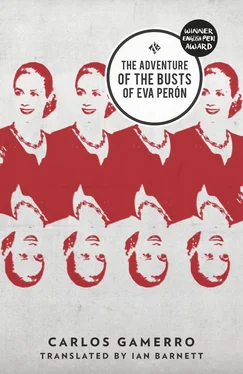‘Is something the matter with you, Marroné? You sound different…’
‘It’s the joy of knowing I’ll soon have those ninety-two busts for you, Sr Govianus,’ he answered exultantly.
And to some extent it was true. At this rate they’d be packed and loaded by the 24th, a day late, true, and cutting it pretty fine, because, being Christmas Eve, they only worked a half-day; but the assembly had voted to celebrate the recovery of the factory by throwing a big asado , open to all — except, of course, police and bureaucrats — and Marroné felt it wasn’t the right time to spoil their fun and blow his credit with them by being a stick-in-the-mud and insisting they finish the job first.
The day of the asado dawned bright and sunny, albeit on the warm side, and the workers were up early to get everything ready for the big bash. They set up tables from the canteen and workshop in the front gardens, watched over by the now companionless David and, realising there weren’t enough, supplemented them with trestles and planks, desks from the offices and even with doors they’d taken off their hinges, draping them with tablecloths of various patterns and colours, contributed by local women, many of them strikers’ wives. Makeshift parrillas cobbled together from gratings, railings and chicken-wire had to be added to the existing ones, and the vast horseshoe of grills was lined below with beds of glowing coals and above with a lorry load of meat — a gift from the workers at a nearby meat-packing plant — which in no time at all was hissing and crackling over the coals, enveloped in the clouds that rose from the sizzling fat, and emitting the most mouth-watering smells in the world: whole sides of beef trimmed with garlands of black puddings, pork sausages and chitterlings; armies of chickens whose skins crisped and goldened; whole sucking pigs, butterflied and gleaming like polished leather, smiling at the thought of how delicious they’d taste; and there, wielding the long knife and fork of the asador , stood El Tuerto, presiding like a grinning Cyclops over this general holocaust of roasting animal flesh. Under a stand of willows, to keep the morning sun off them, stood two tall pyramids of demijohns — one of white, one of red — which had either been donated or sold by local shopkeepers at cost price. There, too, sat heavy wicker baskets lugged by two men apiece and heaped with bread rolls, which, bisected by a brigade of slicers, gaped in anticipation of the sausages and black puddings that would soon fill their jaws. The salad committee were hosing down tubs of lettuces, and slicing tomatoes and onions, then chucking everything into enormous troughs into which others poured bottle after bottle of corn oil and wine vinegar, and tossed it with trowels and wooden spatulas. The blue hats had spent the day before handing out leaflets and sticking up posters, and the news had been spread through a double megaphone atop a Fiat 500, which drove round and round the station square; and all this, coupled with word of mouth and especially the smell that wafted over the brick-and-mortar shacks and corrugated-iron-roofed hovels, and drifted maddeningly in through windows and chinks — passengers were even said to have jumped the train at the station to try their luck — meant that a throng of neighbours and gatecrashers joined the contingents of worker delegates, students and sympathisers, all of whom began milling about among the smoking grills, sitting at the tables or on the lawn, and cadging the first swigs of wine in wax-paper cups. Dozens of children played among the trees, most of them the sons and daughters of workers from the factory, hugging the legs of parents who in some cases hadn’t seen them for days, and Marroné looked on at them with a touch of healthy envy. He had called Mabel the night before, suggesting she should drop in with the children to enjoy a day in the country with his new-found friends, an invitation she had not only most emphatically declined but had followed through with a flurry of recriminations and tears for all the time he’d been away, which segued seamlessly into the subject of the seasonal festivities: ‘Mum and Dad are expecting us on Christmas Eve like every year, and I’ve already made arrangements with yours for…’ Marroné had been non-committal, and Mabel took a breath before launching into a second tirade, ‘I knew it! I knew it! I knew this was all an excuse for you to snub them! I know you, Ernesto Marroné!’ ‘No, you don’t,’ he said to her, after he’d hung up, ‘and if you think things are going to be the same when I come back — if I do come back — you’ve got another thing coming.’ Still, all in good time; for the moment he could just wander and gaze at the kites overhead, listening to the crackle of their paper and the snap of their tails every time the hovering police helicopter flew off, watching any of three football games taking place in the unwooded parts of the grounds, listening to the music from the bands playing on the podium that had been Marroné’s stairway to glory, now reassembled under the shade of the pines. A four-piece was onstage; siku, quena, charango and bombo , played by swarthy young men in ponchos with vicuña and cactus motifs: it was The Atahualpas.
‘Through the jungles of Bolivia
Always watchful, never trivial,
On a mule called Rocinante
Rides this new knight-comandante.
He’s the Revolution’s tiara
And his name is Che…?’
… they asked, pausing and pointing at the audience of wised-up youths, most with long hair and haversacks, who chorused back ‘Guevara!’, and yelled ‘ Presente! ’ and ‘ Viva! ’ Another coincidence, or rather sign, mused Marroné, who hadn’t missed the unmistakeable reference to his colleague from La Mancha.
But most of the time he simply strolled about, enjoying the transformation of the factory’s green lawn into a public park, now and then issuing directives or dealing with workers’ queries: the comrades standing guard in the factory were asking to be relieved (‘Time up,’ he answered); should we take the hostages something to eat (‘What hostages?’), or invite them to join in? (‘Screw them, the exploiting scum!’); the people wanted to cool down with the fire-hoses, could they? (‘Water to the people!’), and every query concluded with the invariable ‘What should we do, Ernesto?’, which became the badge and catchphrase associated with the new Marroné. At one point in this constant toing and froing he ran into Paddy, who had also been rushing back and forth, fielding people’s questions. They stood together for a moment, looking on at the spectacle unfolding before their eyes.
‘Now you see why I became a proletarian?’ his friend exclaimed exultantly. ‘Just look at this. Where else do you find fervour like this?’
Marroné recalled the stands back in St Andrew’s celebrating Paddy’s try against St George’s, but for some reason he felt it would be unwise to bring it up.
Out of sheer contentment Paddy put his arm around Marroné’s shoulder, shaking him, then squeezing him tight. Marroné felt a lump rise to his throat and for a moment he was on the verge of confessing to his part in the coloured-chalk episode, but then he thought it might ruin the moment and let it pass.
‘We’ll beat those sonsofbitches with sheer people power! This is what our Revolution’s all about, Ernesto! Look at their faces! Who’s going to stop us now, for Christ’s sake!’
‘Comrade…’
They both turned round at the same time. The man in mirrored sunglasses who had spoken was dressed in a light leather jacket, zipped up to the collar in spite of the heat, his hair slicked behind his ears into an astrakhan of tight curls at the nape.
Читать дальше











